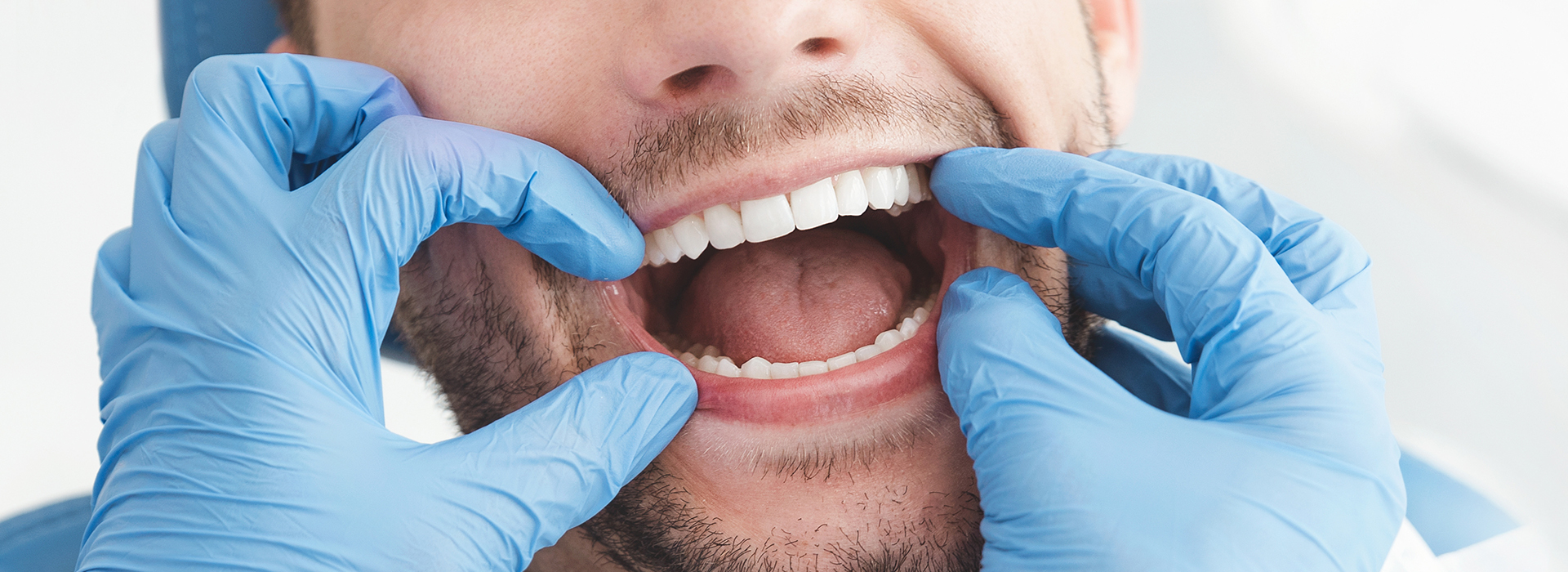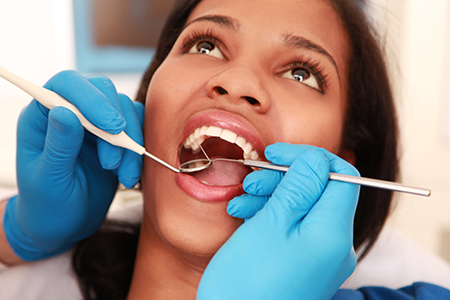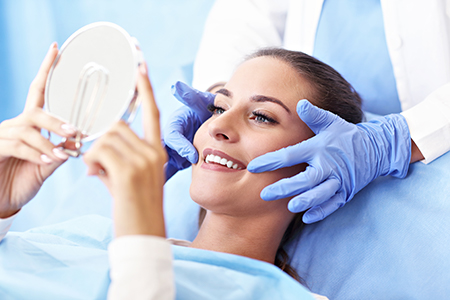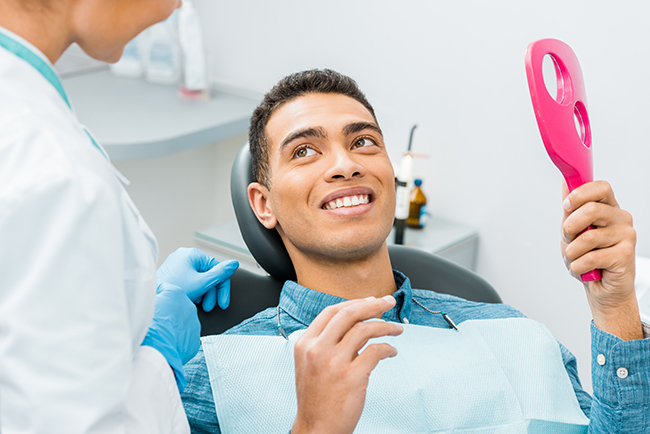New Patients
(732) 813-3564
Existing Patients
(732) 639-3495

At the office of Elegant Dental Arts, we take a forward-looking approach to oral health that emphasizes prevention, early detection, and clear communication. Regular oral exams are the foundation of that approach: they give your dental team the information needed to preserve healthy teeth and gums, identify emerging problems while they're still simple to treat, and tailor recommendations around your lifestyle and goals. Each visit is an opportunity to update medical history, evaluate current oral function, and plan care that helps you maintain a confident, comfortable smile.
Your initial oral exam is a thorough fact-finding visit designed to establish a baseline for your long-term care. We begin by reviewing your medical and dental history, noting medications, past treatments, and any symptoms you may be experiencing. This context helps us interpret what we see during the clinical exam and guides decisions about diagnostic imaging and preventive steps.
The hands-on exam covers the teeth, gums, and soft tissues as well as bite alignment and the function of the temporomandibular joint. We look for signs of decay, gum inflammation, abnormal wear, oral lesions, and other indicators that can point to dental disease or to systemic health concerns. If bruxism (teeth grinding) or bite problems are present, we evaluate their effects and discuss practical management strategies.
When indicated, diagnostic images help us see beneath the surface—between teeth and into the supporting bone. Following the exam and any necessary imaging, your dental provider will explain findings in plain language, outline reasonable next steps, and answer your questions so you can make informed choices about care.

The mouth is not isolated from the rest of the body; it can reflect and influence overall health. During an oral exam we screen for conditions that affect oral tissues as well as signs that may warrant a medical evaluation. For example, persistent gum disease, unusual oral lesions, or chronic dry mouth can be clues to broader health issues that benefit from coordinated care with your physician.
Researchers continue to study links between oral inflammation and systemic conditions such as heart disease, diabetes management, and respiratory health. While these relationships can be complex, routine dental exams and consistent oral hygiene reduce the bacterial burden in the mouth and support general wellness. Our team treats oral exam findings seriously and communicates any concerns that could affect your overall health.
Oral cancer screening is an essential component of every exam. We carefully inspect the lips, tongue, floor of mouth, and surrounding soft tissues for unusual patches, sores, or masses. Early detection of suspicious findings increases treatment options and improves outcomes, which is why timely, professional evaluation matters.

At-home oral hygiene is the cornerstone of dental health, but even meticulous brushing and flossing can miss plaque and calculus in hard-to-reach areas. Professional cleanings remove mineralized deposits and hard-to-reach biofilm, lowering the risk of cavities and periodontal disease. During cleaning visits, hygienists also quantify gum pocket depths and monitor for changes over time so early treatment can be offered when necessary.
Regular checkups give your provider the chance to detect small problems—like early decay or gingival irritation—before they become more complex. Treatment plans developed from routine exams focus on preservation and minimally invasive care whenever possible, and they prioritize preventing future problems through improved home care and targeted preventive therapies.
Children and adolescents benefit from consistent, age-appropriate exams that support healthy development. We evaluate eruption patterns, jaw growth, and the need for any orthodontic assessment. For adults, regular visits help maintain restorative work, monitor wear patterns, and address functional concerns that can affect chewing, speech, and comfort.
Many dental conditions begin beneath the enamel or within the supporting bone, where visual inspection alone cannot reach. Dental imaging provides a reliable window into these deeper structures. X-rays and other imaging tools reveal the presence and extent of decay, bone loss, root pathology, impacted teeth, and other issues that guide diagnosis and treatment planning.
Modern dental imaging is largely digital, producing clear images quickly with reduced radiation compared to older film techniques. Digital radiography enables immediate review, side-by-side comparisons over time, and efficient storage within your electronic record. These advantages help your clinician track progression, collaborate with specialists when needed, and explain findings to you with visual clarity.
When more detailed three-dimensional information is necessary, Cone-Beam Computed Tomography (CBCT) can be used to map tooth positions, jawbone anatomy, and surrounding structures. CBCT is a powerful tool for complex diagnoses and for planning surgical procedures such as implant placement, offering precise anatomic detail that improves safety and outcomes.

Different imaging formats serve different diagnostic purposes. Bitewing images are typically taken to check for decay between the back teeth and to assess changes in bone height. Periapical films focus on individual teeth and the surrounding root structure, making them useful when root infection or pathology is suspected. A full-mouth series combines multiple views to provide a comprehensive snapshot of all teeth and supporting bone.
Panoramic radiographs (panorex) create a broad two-dimensional view of the entire upper and lower jaws, which is helpful for evaluating impacted teeth, overall jaw structure, and developmental issues. Cephalometric images—primarily used in orthodontic assessment—show facial and jaw relationships from a profile perspective and help with growth and treatment planning.
For cases that demand three-dimensional detail, CBCT scans produce high-resolution 3D images that assist with implant planning, evaluation of complex pathology, and precise measurement of bone volume. Your dentist will recommend the level of imaging that balances diagnostic benefit with appropriate radiation stewardship and clinical necessity.
Oral exams are the first line of defense for a healthy mouth and often reveal opportunities to prevent small problems from becoming larger ones. Our team focuses on clear explanations, evidence-based screening, and individualized plans that respect your health goals. If you'd like to learn more about oral exams or schedule an appointment at the office of Elegant Dental Arts, please contact us for more information.
Yes. We always welcome new patients and their families for care. Feel free to give us a call or reach out to us online to schedule a first visit or for any additional information on our office. We look forward to hearing from you!
Routine dental checkups and professional cleanings help ensure your smile remains in tip-top condition and that any developing problems receive the prompt care they require. While it's a good idea to schedule a checkup and cleaning twice a year, longer or shorter intervals between routine visits depend on your specific needs.
We understand that life gets complicated and busy, and for various reasons, you haven't been able to get to the dentist for care. Don't worry; it's always a good time to get back in touch with the health of your smile.
At Elegant Dental Arts, we offer skilled and compassionate care to address a wide range of dental needs. Whether you need a simple checkup and cleaning, restorations, periodontal treatment, root canal therapy, or the replacement of missing teeth to get your smile back into shape, we provide precise, gentle, stress-free treatment to give you a smile that is as beautiful as it is healthy.
Give us a call today; we're happy to address all your questions and concerns about getting your smile back in tip-top condition.
For pregnant women, practicing good oral care and seeing the dentist to maintain a healthy smile is considered an important component of prenatal care. Researchers have found that pregnancy not only increases the risk of oral health problems, but these problems may also lead to pregnancy complications. At the office of Elegant Dental Arts, we provide the skilled and compassionate care required to help expectant mothers keep their teeth and gums in tip-top condition. While certain procedures are not recommended during pregnancy, we provide the necessary care and take all the necessary precautions required.
Thanks to advances in modern dentistry, teeth that have been affected by a range of imperfections or that have sustained damage from trauma or dental decay can be restored to produce a naturally beautiful looking and functional smile.
As skilled and experienced providers of care, our office can effectively improve and enhance the appearance of teeth that are stained, discolored, misshapen, chipped, fractured, gapped, crowded, or broken down due to dental decay. At the office of Elegant Dental Arts, we offer a comprehensive selection of the leading-edge cosmetic solutions from teeth whitening procedures, dental bonding, tooth-colored fillings, and veneers, to prosthetic solutions and dental implants to rebuild complete and beautiful smiles.
Contact our office to learn more about the many ways we can help you create the smile you've always wanted.
If you're visiting Elegant Dental Arts for the first time, it is helpful that you contact your former dental office and have your records sent over to us. Make note of any problems you may have so that you can discuss them with your dentist.
To provide efficient service, we ask you to please bring your insurance card, an ID, plus any referral slips or diagnostic records given to you by another office. If you are taking medications, please note or make a list of what they are as you will need to provide that information.
Yes! We assure you that both you and your family will be in good hands at the office of Elegant Dental Arts.
We do our best to make sure every patient who steps into our office for care is put at ease. We provide precise and gentle care and our skilled, compassionate team strives to make every visit stress-free. You can rest assured that your smile is in the best of hands and that we are doing all we can to ensure your comfort throughout every procedure. While we always take the time to explain every step in care, feel free to ask us any questions about local anesthesia and methods of dental sedation.
At the office of Elegant Dental Arts, we strive to provide the highest quality of care to address all your dental needs. Once we've had the opportunity to examine your smile, we can give you a clear picture of any dental issues that are present, along with a quote for what the cost of treatment will be. The cost of care all depends upon the extent and complexity of issues affecting the health or appearance of your smile and the types of procedures that are required. Our goal is to make dental care more affordable so that you can begin treatment without any additional stress or delay.
Keep in mind that with routine dental checkups and periodic care, we can help prevent dental disease while treating emerging problems early in their onset to avoid larger issues and more expensive care down the road.
Routine dental checkups and preventive care procedures may be covered under your dental insurance plan requiring little to no out-of-pocket expense. We invite you to check our financial information page or give us a call to find out if our office participates with your plan, and if you have any other questions about dental insurance, dental savings plans, forms of payment, or financing options. We welcome your inquiries and do our best to help you begin care without additional stress or delay.
If you've lost a tooth due to injury, decay, gum disease, or any other reason, we recommend dental implants to replace missing teeth. Dental implants come the closest to replicating the look, feel, and function of your natural teeth.
Absolutely! Both flossing and brushing regularly are equally important to maintain your oral health. While brushing cleans the surface of your teeth, flossing cleans in between them. Flossing is important to prevent plaque buildup, which can cause gums to recede and lead to periodontal disease.
Even if you have dentures, it is still necessary to see a dentist! Dental checkups help ensure that your dentures are comfortable, fitting properly, and that there are no other problems. Beyond assessing your dentures, our dentist will also perform a thorough examination of the jawbone, and surrounding soft tissues both inside the mouth, the face, and neck, to confirm that you remain in good oral health.
Emergency dental care is a service we hope you'll never need- but if you do, the office of Elegant Dental Arts is here for you!
Whether you're suffering from a chipped tooth, toothache, or any problem affecting your oral health, you can be sure to get the prompt attention and compassionate care you require at our office. Patient care and comfort are our top priorities, and we offer a comprehensive range of the most advanced services to address a broad spectrum of dental needs.
While the pain of a toothache is one of the more common reasons that patients come to our office for emergency dental care, we also promptly treat emergencies that are not necessarily painful like crowns that have been dislodged and broken dentures that leave embarrassing gaps in one's smile.
You can rest assured that your oral health is in the best of hands at our office. We'll quickly determine exactly what's wrong, explain your treatment options, and then provide the precise and gentle care you require to alleviate your discomfort and get you back on the path to oral health and wellness.
Your health and comfort are our top priorities. If your dental emergency is painful, if it affects the appearance of your smile, or if you suspect that an infection is present, our office will make every effort to see you as soon as possible for care.
At the office of Elegant Dental Arts, we welcome patients of all ages for care and offer a comprehensive range of services designed to help every member of your family maintain a beautiful and healthy smile. Whether you or a loved one needs a routine checkup and cleaning, fillings, same-day crowns, a cosmetic smile makeover, the replacement of missing teeth or require the services of a skilled and compassionate emergency dentist, you can rely on our office for the highest quality care.
For more information on our office and the many services we provide, or to schedule an appointment for care, give us a call today.
A comprehensive oral exam begins with a review of your medical and dental history to identify factors that affect oral health. The clinician will ask about medications, recent symptoms, and any changes in general health so findings can be interpreted in context. This discussion helps guide the physical exam and any decisions about diagnostic imaging.
During the clinical portion the dentist or hygienist evaluates the teeth, gums, soft tissues, bite alignment and temporomandibular joint function to identify signs of decay, inflammation, abnormal wear or oral lesions. The clinician will palpate tissues and visually inspect hard-to-see areas, documenting any concerns and comparing them with prior records when available. After the exam you will receive a clear explanation of findings and recommended next steps so you can make informed choices about care.
Frequency of oral exams depends on individual risk factors such as history of periodontal disease, active decay, medical conditions, and restorative needs. For many patients, checkups every six months balance prevention and monitoring, while others may require more frequent visits based on clinical judgment. Your provider will recommend an interval tailored to your oral health and overall health profile.
When risk changes—for example, new medications, pregnancy, or recent dental treatment—the exam schedule may be adjusted to ensure timely follow-up. Regular appointments allow clinicians to detect small problems early and to update preventive strategies. Staying on a recommended schedule helps maintain long-term oral stability and preserves restorative work.
Oral cancer screening is an essential element of routine examinations because early lesions and abnormal tissue changes can be subtle and symptomless. Clinicians visually inspect and palpate the lips, tongue, floor of mouth and other soft tissues to look for unusual patches, sores or masses that warrant closer evaluation. Early detection increases treatment options and improves outcomes, so screening is treated as a standard practice at each visit.
If suspicious findings are identified, the clinician documents their appearance and recommends appropriate follow-up, which may include monitoring, adjunctive testing or referral for biopsy. The goal is to act promptly while avoiding unnecessary alarm, using objective criteria to guide next steps. Patients are also advised about risk factors and signs to watch for between visits.
The mouth provides important clues about systemic health because oral tissues can reflect conditions such as diabetes, nutritional deficiencies and autoimmune disorders. Persistent gum disease, chronic dry mouth, or recurrent oral lesions may signal underlying medical issues that benefit from coordination with a physician. Clinicians screen for oral manifestations of systemic disease and communicate concerns that could affect general health management.
Research continues to explore links between oral inflammation and broader conditions like cardiovascular disease and diabetes, and maintaining good oral hygiene is part of reducing bacterial burden. Regular exams help identify inflammatory trends early and support interventions that contribute to overall wellness. The dental team emphasizes collaborative care when oral findings have potential systemic implications.
Dental imaging complements the clinical exam by revealing conditions that are not visible to the naked eye, such as interproximal decay, root pathology and changes in supporting bone. Digital radiographs and other imaging modalities allow the clinician to assess tooth structure, root health and bone levels quickly and with high image clarity. Images are reviewed with patients to explain findings and to support treatment planning.
When three-dimensional detail is necessary for complex diagnoses or surgical planning, Cone-Beam Computed Tomography (CBCT) provides precise anatomic information about tooth positions and bone volume. The clinician selects the level of imaging that balances diagnostic benefit, radiation stewardship and clinical necessity. Accurate imaging improves diagnostic confidence and helps avoid surprises during treatment.
Different imaging formats serve specific diagnostic needs: bitewing radiographs highlight decay between posterior teeth and evaluate crestal bone levels, while periapical films focus on individual tooth roots and surrounding bone for endodontic or periapical assessment. Panoramic radiographs provide a wide view of the jaws useful for impacted teeth, developmental assessment and an overall screening of the dentition. Each modality contributes unique information that guides clinical decisions.
Cephalometric images are typically used in orthodontic assessment to analyze facial proportions and jaw relationships, and CBCT offers three-dimensional detail for implant planning, evaluation of complex pathology and precise measurement of bone. The clinician will recommend the least extensive imaging that delivers necessary diagnostic information. This approach helps ensure appropriate care while minimizing patient exposure to radiation.
Exams for children and adolescents focus on growth, development and prevention, with attention to eruption patterns, spacing and jaw relationships that influence future dental health. The clinician assesses primary and permanent teeth, monitors for early decay, and evaluates the need for sealants or fluoride therapies to protect newly erupted surfaces. Discussion with parents includes home care guidance that matches the child’s developmental stage.
Pediatric exams also screen for habits such as thumb-sucking or mouth breathing that can affect dental development and may prompt referral to specialists when appropriate. Timing of orthodontic evaluation is considered based on eruption and jaw growth rather than age alone. Establishing a positive experience during early visits supports lifelong oral health habits and consistent monitoring.
Preparation for an oral exam is straightforward: bring any updated medical information, a list of medications and questions or concerns you want to address during the visit. If you have recent imaging or records from another provider, bringing copies or arranging record transfer can help the clinician compare current findings with previous data. Clear communication about symptoms and medical history improves diagnostic accuracy.
Avoiding heavy oral hygiene products immediately before the visit is not necessary, but note any unusual symptoms such as pain, swelling or changes in sensation so they can be specifically evaluated. If you have special health conditions or mobility needs, informing the office ahead of time allows for appropriate accommodations. Good preparation ensures the exam is efficient and thorough.
You should schedule an earlier exam if you notice persistent pain, swelling, unexplained bleeding, a new or changing oral lesion, or sudden changes in bite or tooth mobility. These signs can indicate developing infection, trauma, periodontal disease or other conditions that benefit from prompt evaluation. Early assessment reduces the likelihood of complications and expands conservative treatment options.
Other triggers for sooner assessment include chronic dry mouth, recurrent ulcers, or symptoms that affect speech, swallowing or breathing. If you experience acute trauma to the mouth or jaw, seek professional evaluation promptly to rule out fractures or tooth displacement. When in doubt, contacting the office to describe symptoms helps determine the appropriate timing for care.
Findings from the exam and any imaging form the basis of a personalized treatment plan that prioritizes preservation and minimally invasive care whenever feasible. The clinician will explain identified issues, outline recommended interventions and describe preventive measures to reduce recurrence or progression. Plans may include monitoring, restorative treatment, periodontal therapy or referrals to specialists depending on clinical needs.
The care plan also sets priorities and timelines based on symptom severity, risk factors and your personal goals for oral health and function. Clinicians discuss alternatives and answer questions so you can make informed decisions about next steps. When treatment is indicated, follow-up appointments and home-care recommendations are coordinated to support predictable outcomes at Elegant Dental Arts.

